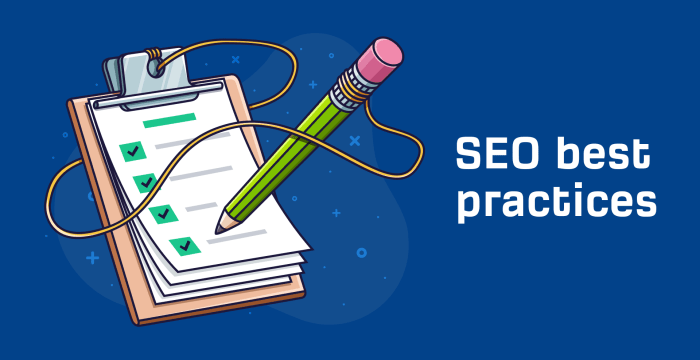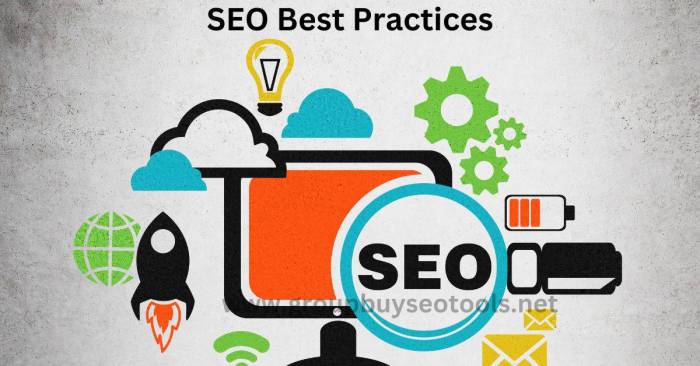SEO Best Practices – Best Practices sets the stage for this enthralling narrative, offering readers a glimpse into a story that is rich in detail with american high school hip style and brimming with originality from the outset.
In today’s digital age, mastering Best Practices can make or break a website’s success. From boosting visibility to improving search engine rankings, these practices are the keys to unlocking online potential. Let’s dive into the world of optimization and discover how it can transform your online presence.
Importance of Best Practices
Implementing best practices is crucial for improving a website’s visibility and increasing its chances of ranking higher on search engine results pages. By following these practices, websites can attract more organic traffic, reach a wider audience, and establish credibility in their respective industries.
Benefits of Implementing Best Practices
- Improved Search Engine Ranking: By optimizing website content and structure, websites can rank higher in search results, making it easier for users to find them.
- Increased Organic Traffic: best practices help websites attract more organic traffic, reducing the need for paid advertising and increasing overall visibility.
- Enhanced User Experience: Implementing best practices often leads to a better user experience, with faster loading times, mobile responsiveness, and easy navigation.
- Builds Credibility and Trust: Websites that follow best practices are seen as more trustworthy and authoritative, leading to higher levels of user engagement and conversions.
Impact of Neglecting Best Practices
- Decreased Visibility: Websites that neglect best practices may struggle to rank well in search results, resulting in lower visibility and fewer visitors.
- Loss of Potential Customers: Without proper optimization, websites may miss out on valuable traffic and potential customers who are searching for products or services online.
- Competitive Disadvantage: In today’s digital landscape, where competition is fierce, neglecting best practices can put websites at a disadvantage compared to competitors who are actively optimizing their sites.
On-Page Best Practices: SEO Best Practices
To improve your website’s visibility and ranking on search engine results pages (SERPs), it’s essential to implement effective on-page best practices. These strategies focus on optimizing individual web pages to ensure they are easily discoverable by search engines and provide valuable information to users.
Optimizing Meta Titles and Descriptions
Meta titles and descriptions play a crucial role in on-page as they are the first thing users see on SERPs. By optimizing these elements, you can increase click-through rates and improve your site’s overall performance.
- Include Target s: Incorporate relevant s in your meta titles and descriptions to signal to search engines what your page is about.
- Keep it Concise: Meta titles should be around 50-60 characters, while meta descriptions should be around 150-160 characters to ensure they display properly on SERPs.
- Write Compelling Copy: Craft engaging meta titles and descriptions that entice users to click through to your site. Use action-oriented language and highlight unique selling points.
- Avoid Duplicate Content: Each page on your site should have unique meta titles and descriptions to avoid confusion for search engines and users.
Importance of Internal Linking Structure
Internal linking is a crucial on-page best practice that helps search engines understand the hierarchy and relevance of your content. By strategically linking related pages within your site, you can improve crawlability, distribute link equity, and enhance user experience.
- Establish a Hierarchical Structure: Organize your content into categories and subcategories, then use internal links to connect related pages within the same topic cluster.
- Use Descriptive Anchor Text: When creating internal links, use descriptive anchor text that gives users and search engines context about the linked page’s content.
- Link to High-Quality Content: Internal links should point to valuable, relevant content that provides additional information or enhances the user’s journey through your site.
- Regularly Audit and Update Links: Periodically review your internal linking structure to ensure all links are working correctly and pointing to relevant, up-to-date content.
Off-Page Best Practices

When it comes to improving search engine rankings, off-page plays a crucial role in establishing the authority and credibility of a website. It involves optimizing factors outside of your website that can impact your site’s visibility in search engine results pages.
Building High-Quality Backlinks, SEO Best Practices
One of the most effective strategies for boosting off-page is to build high-quality backlinks from reputable and relevant websites. Backlinks act as signals of trust and authority to search engines, indicating that your website is a valuable resource. Here are some tips for acquiring quality backlinks:
- Guest posting on authoritative websites in your industry
- Creating shareable content that naturally attracts backlinks
- Engaging in influencer outreach to secure backlinks from influencers
- Monitoring and disavowing toxic backlinks that could harm your efforts
Social Media’s Role in Off-Page
Social media platforms have become integral to off-page as they provide opportunities to increase brand visibility, drive traffic to your website, and engage with your target audience. When used strategically, social media can positively impact your website’s search engine rankings. Here’s how you can leverage social media for off-page :
- Share your content across various social media channels to reach a wider audience
- Encourage social sharing by including social sharing buttons on your website
- Engage with your followers and participate in relevant conversations to build a strong online presence
- Monitor social media mentions of your brand and respond promptly to maintain a positive reputation
Technical Best Practices

In addition to on-page and off-page , website owners must also focus on technical to ensure their site is optimized for search engines.
Website Speed Optimization
Optimizing website speed is crucial for as search engines prioritize fast-loading sites. Slow loading times can lead to higher bounce rates and lower rankings.
- Minimize HTTP requests by reducing the number of elements on each page.
- Enable browser caching to store frequently accessed resources locally.
- Optimize images by compressing them without compromising quality.
- Utilize a content delivery network (CDN) to distribute content across different servers.
Mobile Responsiveness
Mobile responsiveness is essential in technical as more users access websites from mobile devices. A mobile-friendly site not only improves user experience but also boosts search engine rankings.
- Use responsive web design to ensure your site adapts to various screen sizes.
- Avoid intrusive pop-ups that can hinder mobile usability.
- Optimize font sizes and spacing for easy readability on smaller screens.
- Test your site on different mobile devices to ensure consistent performance.





